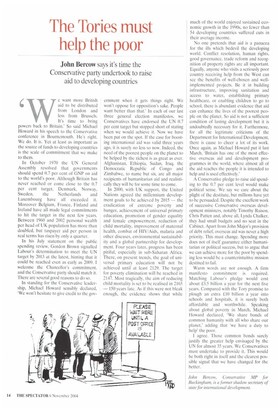The Tories must help the poor
John Bercow says it's time the Conservative party undertook to raise aid to developing countries
We want more British aid to be distributed from London and less from Brussels. It's time to bring powers back to Britain.' So said Michael Howard in his speech to the Conservative conference in Bournemouth. He's right. We do. It is. Yet at least as important as the source of funds to developing countries is the scale of commitment that we make to them.
In October 1970 the UN General Assembly resolved that governments should spend 0.7 per cent of GNP on aid to the world's poor. Although Britain has never reached or come close to the 0.7 per cent target, Denmark, Norway, Sweden, the Netherlands and Luxembourg have all exceeded it. Moreover Belgium, France, Finland and Ireland have all made legal commitments to hit the target in the next few years. Between 1960 and 2002 personal wealth per head of UK population has more than doubled, but taxpayer aid per person in real terms has risen by only a quarter.
In his July statement on the public spending review, Gordon Brown signalled Labour's determination to meet the UN target by 2013 at the latest, hinting that it could be reached even as early as 2009. I welcome the Chancellor's commitment, and the Conservative party should match it. There are several good reasons to do so.
In standing for the Conservative leadership, Michael Howard sensibly declared, 'We won't hesitate to give credit to the gov
ernment when it gets things right. We won't oppose for opposition's sake. People want better than that.' In each of our last three general election manifestos, we Conservatives have endorsed the UN 0.7 per cent target but stopped short of stating when we would achieve it. Now we have been put on the spot. If the case for boosting international aid was valid three years ago, it is surely no less so now. Indeed, the need of the poorest people on the planet to be helped by the richest is as great as ever. Afghanistan, Ethiopia, Sudan, Iraq, the Democratic Republic of Congo and Zimbabwe, to name hut six, are all major recipients of humanitarian aid and realistically they will be for some time to come.
In 2000, with UK support, the United Nations agreed the millennium development goals to be achieved by 2015 — the eradication of extreme poverty and hunger, achievement of universal primary education, promotion of gender equality and female empowerment, reduction of child mortality, improvement of maternal health, combat of HIV/Aids, malaria and other diseases, environmental sustainability and a global partnership for development Four years later, progress has been pitiful, especially in sub-Saharan Africa. There, on present trends, the goal of universal primary education will not be achieved until at least 2129. The target for poverty elimination will he reached in 2147. Most tragically. the aim of reducing child mortality is set to be realised in 2165 — 150 years late. As if this were not bleak enough, the evidence shows that while much of the world enjoyed sustained economic growth in the 1990s, no fewer than 54 developing countries suffered cuts in their average income.
No one pretends that aid is a panacea for the ills which bedevil the developing world. Conflict resolution, human rights, good governance, trade reform and recognition of property rights are all important. Equally, anyone who visits a seriously poor country receiving help from the West can see the benefits of well-chosen and wellimplemented projects. Be it in building infrastructure, improving sanitation and access to water, establishing primary healthcare, or enabling children to go to school, there is abundant evidence that aid can enhance the lives of the poorest people on the planet. So aid is not a sufficient condition of lasting development but it is undoubtedly necessary for it. Furthermore, for all the legitimate criticisms of the Department for International Development, there is cause to cheer a lot of its work. Once again, as Michael Howard put it last March, 'Britain has one of the most effective overseas aid and development programmes in the world, where almost all of the aid reaches the people it is intended to help and is used effectively.'
A Conservative pledge to raise aid spending to the 0.7 per cent level would make political sense. We say we care about the plight of the destitute, but millions have yet to he persuaded. Despite the excellent work of successive Conservative overseas development ministers, notably Timothy Raison, Chris Patten and, above all, Lynda Chalker, they had small budgets and no seat in the Cabinet. Apart from John Major's provision of debt relief, overseas aid was never a high priority. This must change. Spending more does not of itself guarantee either humanitarian or political success, but to argue that we can achieve more for the poor by spending less would be a counterintuitive mission destined to fail.
Warm words are not enough. A firm manifesto commitment is required. Matching Labour's pledge would cost about £3.5 billion a year for the next five years. Compared with the Tory promise to plough an extra £10 billion a year into schools and hospitals, it is surely both affordable and worthwhile. Speaking about global poverty in March, Michael Howard declared, 'We share bonds of common humanity with all who share our planet,' adding that 'we have a duty to help' the poor.
1 agree. Those common bonds surely justify the greater help envisaged by the UN for almost 35 years. We Conservatives must undertake to provide it. This would be both right in itself and the clearest possible signal that we have changed for the better.
John Bercow, conservative MP for Buckingham, is a former shadow secretary of state for international development.


























































































































 Previous page
Previous page